-
South Africa: What Climate Change Might Mean for Malaria in South Africa
spotlight, 7 August 2023
Malaria-carrying mosquitoes will, and are already moving to new habitats as the earth warms up due to climate change. They are expected to breed faster and bite more often. As a… Read more »
-
Africa: Climate Change Is Making Us Sick, Says WHO Envoy #AfricaClimateCrisis
IPS, 2 August 2023
Climate change is making us sick. It has become urgent to build resilient health systems to secure humanity's well-being, says the special envoy for climate change and health of… Read more »
-
Uganda: Is Climate Change Fueling Uganda's Malaria Burden?
Independent (Kampala), 3 July 2023
Even though the government has over the past couple of decades masterminded a wide-range of interventions in its fight against malaria, one of the deadliest diseases on earth,… Read more »
What Climate Change Might Mean for Malaria in Africa
Malaria-carrying mosquitoes will, and are already moving to new habitats as the earth warms up due to climate change. They are expected to breed faster and bite more often. As a result, malaria cases may go up, impacting elimination efforts, infectious disease experts warn, according to Adele Baleta writing for spotlight.
Sub-Saharan Africa is currently the region most affected by malaria. While South Africa has an excellent record of malaria control compared to other countries in the region and close to malaria elimination in Mpumalanga and KwaZulu-Natal, climate change could frustrate progress, according to Professor Rajendra Maharaj, Director of the Malaria Research Unit at the South African Medical Research Council. Meanwhile the World Health Organization (WHO) estimates that there are 247 million cases of malaria globally, 619 000 of which were fatal. Africa is home to 95% of these cases and 96% of the deaths.
Climate change has also been cited as a primary cause in rising cholera cases across Africa with the WHO citing "extreme climatic events" as cause for people to flee their homes.
Efforts to curb potential future pandemics - a need rising from the impact of Covid-19 on the world - has also seen member states of the global health body negotiate the first pandemic accord which calls for the placement of effective mechanisms to prevent, prepare, and better respond to the next global health threat.
InFocus
-
The 194 Member States of the World Health Organization are currently negotiating the first pandemic accord. Acknowledging that the world learned many hard lessons from the Covid-19 ... Read more »
-
A spike in conflict and displacement in the eastern Democratic Republic of the Congo (DRC) is pushing children into the worst cholera crisis since 2017, warns UNICEF. "If urg Read more »

A feeding female Anopheles stephensi mosquito. A. stephensi is a known vector for the parasitic disease malaria (file photo).




